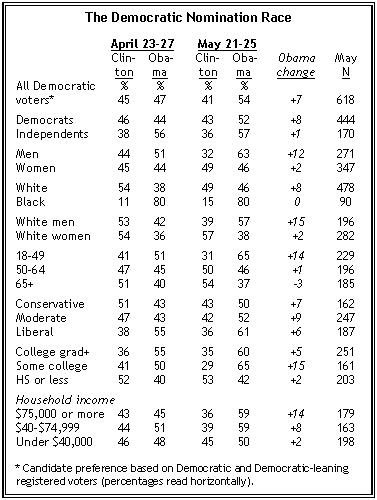
On the eve of the final Democratic primaries, Barack Obama has opened a 13-point lead over Hillary Clinton among Democratic and Democratic-leaning voters nationwide. This represents a substantial shift from a month ago, when Clinton had pulled within two points of Obama in the wake of her victory in the Pennsylvania primary.
Obama now leads Clinton among both Democrats and Democratic-leaning independents, and he leads among both Conservative Democrats – who have traditionally favored Clinton – as well as moderates and liberals.
While Obama now enjoys a large lead, Hillary Clinton continues to garner the majority of support among some segments of the Democratic base. In particular, 57% of white women favor Clinton as the party’s nominee, while just 38% favor Obama – virtually unchanged from a month ago. Similarly, while Obama leads by 65% to 31% among Democratic voters under age 50, Clinton still garners the support of most Democrats ages 50 and older. And a 53% majority of Democratic voters who have not attended college continue to back Clinton for the party nomination.
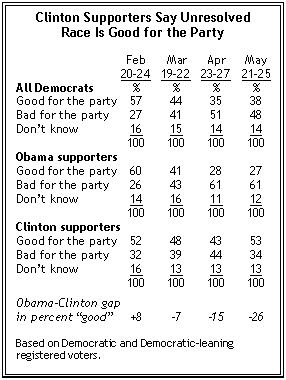
Effects of a Long Primary
Just under half (48%) of Democratic and Democratic-leaning voters say the fact that the contest between Clinton and Obama is still going on is a bad thing for the Democratic Party, while 38% say the continuing contest is a good thing. Not surprisingly, voters who back Obama are more likely to express a negative view of the long campaign than are Clinton backers. Obama’s supporters – by greater than two-to-one – believe that the continuing race is bad for the party rather than good for the party (61% vs. 27%). By contrast, most Clinton supporters (53%) say that the unresolved contest is a good thing. In fact, the proportion of Clinton supporters who view the longer contest as good for the party has increased 10 points from a month ago.
Supporters of both Clinton and Obama have a less positive view of the opposing candidate than they did earlier in the campaign. Among Clinton’s backers, about as many offer an unfavorable view of Barack Obama (44%) as offer a favorable opinion (45%). In February, a majority of Clinton supporters (54%) expressed a favorable opinion of Obama compared with 39% who had a negative view.
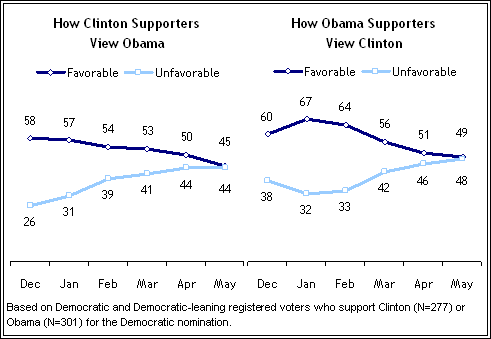
The same pattern is evident in how Obama’s supporters view Clinton. Currently, about as many express a positive opinion of Clinton as express a negative opinion (49% vs. 48%). In February, favorable assessments of Clinton outnumbered unfavorable views by nearly two-to-one (64% to 33%) among Obama’s backers.
Will the Party Unite Behind Obama?
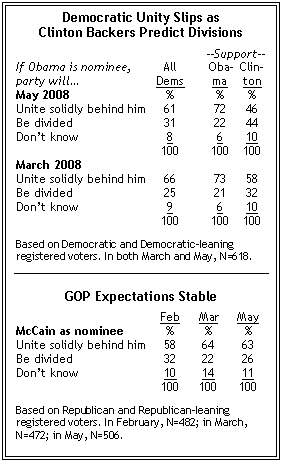
By a margin of roughly two-to-one (61% to 31%), Democratic and Democratic-leaning voters say their party will unite behind Barack Obama if he becomes its nominee. However, the proportion saying the party will face significant divisions has increased six points since March (from 25% to 31%).
There has been virtually no change in opinion on this issue among those who support Obama in the primary; however, those who support Clinton have become far less inclined to predict that the party will unify behind Obama. In March, 58% of Clinton supporters said the party would come together to back Obama if he became the Democratic presidential candidate. Now, just 46% of Clinton supporters express this view. Accordingly, the proportion of Clinton supporters saying the party will be divided if Obama is the nominee has increased from 32% in March to 44% today.
Most Republican and Republican-leaning voters (63%) expect their party to unite solidly behind presumptive nominee John McCain. Just 26% believe that differences and disagreements within the party will keep many Republicans from supporting McCain. Notably, conservative Republican voters (65%) and white evangelical Christian Republican voters (62%) – groups whose support McCain has actively sought – are as likely as Republican voters overall to expect party unity behind McCain.
Hillary for VP?
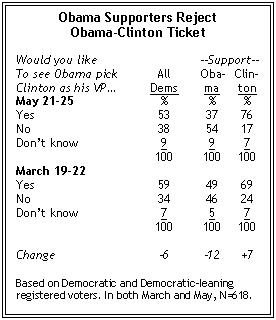
A narrow majority of Democratic and Democratic-leaning voters (53%) say they would like to see Obama pick Hillary Clinton as his vice presidential running mate if he becomes the Democratic nominee. Clinton’s supporters in the nomination contest are increasingly supportive of the prospect of an Obama-Clinton ticket; 76% say they would like Obama choose Clinton as his vice president, up from 69% in March. By contrast, just 37% of Obama backers say they would like to see him pick Clinton as his running mate, down from 49% in March. Instead, most Obama supporters (54%) say they do not want to see Clinton join the ticket.


